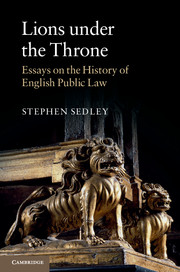Book contents
- Frontmatter
- Epigraph
- Dedication
- Contents
- Preface
- Introduction
- Part I Histories
- 1 Lions in winter: public law in the twentieth century
- 2 The dark satanic mills: the Victorian state
- 3 New corn from old fields: the Hanoverian harvest
- 4 Parchment in the fire: public law in the Interregnum
- 5 The future of public law
- Part II Themes
- Index
3 - New corn from old fields: the Hanoverian harvest
from Part I - Histories
Published online by Cambridge University Press: 05 November 2015
- Frontmatter
- Epigraph
- Dedication
- Contents
- Preface
- Introduction
- Part I Histories
- 1 Lions in winter: public law in the twentieth century
- 2 The dark satanic mills: the Victorian state
- 3 New corn from old fields: the Hanoverian harvest
- 4 Parchment in the fire: public law in the Interregnum
- 5 The future of public law
- Part II Themes
- Index
Summary
In the third quarter of the eighteenth century a series of governmental attempts to suppress public criticism produced a backlash which forced judges, juries and the law to take sides. They sided with personal liberty, with enduring consequences. This chapter looks among other things at how these developments have conditioned the extent and use of both ministerial and judicial powers.
The ministerial ascendancy
With somewhat artificial precision, Sir William Anson picked 1714, the year in which George of Hanover ascended the British throne, as the point at which the Crown ceased to govern through its ministers and ministers began to govern through the Crown. But his point was an important one. The settlement of 1689 had constitutionalised the monarchy and had at least begun to make it the political servant of Parliament; but the statutory Protestant succession, by placing on the throne a king who spoke no English and preferred to be in Hanover, decisively accelerated the transfer of political power from the monarch's personal secretaries of state to a political ministry deriving its authority from Parliament.
The rule of law
So too in the sphere of law, a full century before George ascended the throne, Coke in the Case of Prohibitions, had told James I that his judicial function was not his own: it was exercised in his name by his judges, and had been since the Norman Conquest. Historians have characterised Coke's mind as “essentially mediaeval” and his institutional thinking as “rooted in the historical past”; but Coke wore this as a badge of honour:
“Out of the old fields,” he wrote, “must come the new corne.”
Like other active jurists of the Jacobean years, Coke was able to reach back, past the autocratic regimes of the Tudors and the house of York, not only to Bracton in the mid-thirteenth century but to Henry VI's Chief Justice Sir John Fortescue who, writing in the mid-fifteenth century, had said that it was “not customary for the kings of England to sit in court or pronounce judgment themselves; and yet they are called the king's judgments”.
- Type
- Chapter
- Information
- Lions under the ThroneEssays on the History of English Public Law, pp. 70 - 82Publisher: Cambridge University PressPrint publication year: 2015



